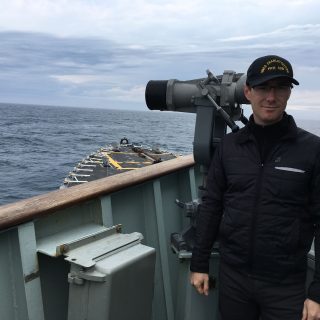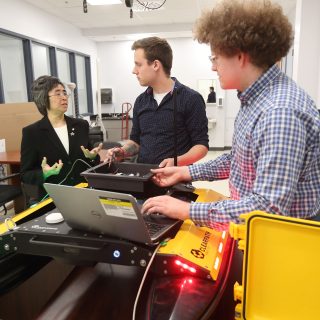Our Stories
Changing environmental conditions and advancements in engineering and technology have led to more ship traffic in Canada’s Arctic. This change comes with exciting opportunities, but also increased risk. One potential risk is accidental spills of oil and other harmful substances.
Creating a sustainable future for ocean transportation is vital to supporting Canada’s economic and environmental interests. With funding from Irving Shipbuilding, the Enhanced Capacity for Oil Spill Situational Awareness and Response (ECOSAR) project team is developing practical, community-based solutions for these issues.
One goal of the project is to develop a program that uses satellite data to detect when an oil spill occurs. A second focus is to develop and deliver an oil spill response training program for Nunavut residents.

In August 2018, the ECOSAR team worked closely with the Nunavut Department of Environment to prepare and deliver an oil spill response course in Iqaluit, Nunavut. The workshop was attended by 20 representatives from every region of Nunavut. These representatives received training to become trainers, with the goal of returning to their regions to help build a critical mass of potential responders for all Nunavut communities.
“Sustainable development in the Arctic requires maintaining a delicate balance between enabling economic benefits for local populations and managing the resulting risks to their environment,” said Thomas Puestow, Principal Investigator for the project. “ECOSAR will engage Arctic communities in reducing the risk of Arctic shipping by building the local capacity for oil spill response, thus mitigating the potential for marine pollution impacts on food security and traditional livelihoods”
The ECOSAR team is led by C-CORE, a not-for-profit research-and-development corporation based at Memorial University in St. John’s, Newfoundland and Labrador. C-CORE specializes in research-based advisory services and technology solutions for harsh environments. Other project partners include Memorial University’s Fisheries and Marine Institute, the Nunavut Fisheries and Marine Training Consortium, and Polar View.
ECOSAR is one of nine research projects supported by Irving Shipbuilding’s $2 million investment in the Nunavut Arctic College. The investment supports nine applied Arctic research projects focused on areas of importance to Canada’s Arctic communities and marine industry.
The funding is part of Irving Shipbuilding’s Value Proposition commitments under the National Shipbuilding Strategy. While its 2,000 shipbuilders construct the Royal Canadian Navy’s future fleet, to date, Irving Shipbuilding has committed more than $12 million in Value Proposition investments toward creating a sustainable marine industry across Canada.


